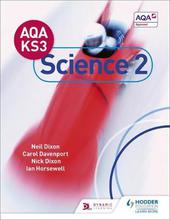
|
AQA Key Stage 3 Science Pupil Book 2
Paperback
Main Details
| Title |
AQA Key Stage 3 Science Pupil Book 2
|
| Authors and Contributors |
By (author) Neil Dixon
|
|
By (author) Carol Davenport
|
|
By (author) Nick Dixon
|
|
By (author) Ian Horsewell
|
|
By (author) Jenny Wakefield-Warren
|
| Physical Properties |
| Format:Paperback | | Pages:264 | | Dimensions(mm): Height 278,Width 214 |
|
| ISBN/Barcode |
9781471899980
|
| Classifications | Dewey:500 |
|---|
| Audience | |
|---|
|
Publishing Details |
| Publisher |
Hodder Education
|
| Imprint |
Hodder Education
|
| Publication Date |
26 January 2018 |
| Publication Country |
United Kingdom
|
Description
Ensure that every student develops the maths, literacy and working scientifically skills they need to succeed with this skills-focused Pupil Book that contains a variety of activities, questions and real-world examples that are tailored to the Big Ideas and mastery goals of the AQA KS3 Syllabus. - Develop conceptual understanding with a variety of questions that require students to apply their knowledge to real-world scenarios. - Build working scientifically skills with various Enquiry activities matched to the AQA syllabus. - Test understanding and measure progress with factual recall questions developed around the ideas of Generalisations, Principles and Models. - Stretch knowledge and understanding with extend tasks linked to higher-order thinking skills - Compare, Evaluate and Predict. - Bridge the gap between Key Stages 2 and 3, with a focus on maths and enquiry skills and understanding scientific terminology. - Provides comprehensive support for non-specialist or less-confident teachers when used in conjunction with the online Teaching & Learning resources. Written in association with Sheffield Hallam University: The Science Education Team within Sheffield Institute of Education (SIoE), is one of the leading STEM education groups in Europe, with a worldwide reputation for knowledge exchange and research. SIoE leads national and international STEM education programmes covering curriculum and pedagogical design and development, widening participation to traditionally under-represented groups, and research in science education.
|